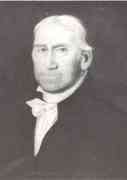James Winchester |
|
|---|---|
| Born | 2/26/1752 in Carroll County, Maryland |
| Died | 7/26/1826 in Gallatin, Tennessee |
Biography |
|
Before he was a city planner James Winchester had been a soldier. He fought in the American Revolution with the Maryland regiments and spent 3 years as a prisoner of war. He returned to fight through the rest of the revolution and was eventually discharged at the rank of captain. After the revolution Winchester moved to North Carolina, stayed active in the militia and and became successful in private business as well. At various times Winchester operated mills, distilleries and cotton gins. When the state of Tennessee was formed Winchester was voted the first speaker of the Senate. He stayed active in the public census and surveying the boundary lines between white and Indian territories. In 1800 he formed his first planned community, a town called Cairo located on the Cumberland River and became a partner in with John Overton in a purchase on the fourth Chickasaw bluff that would later become Memphis. In 1812 Winchester, longing for military action offered his services in the war of 1812. By now a brigadier General Winchester had the poor fortune to join a war already headed by powerful personages such as Andrew Jackson and William Henry Harrison. Winchester eventually ran afoul of Harrison. Eager for action, but in competition for glory, Winchester army is defeated and captured at the River Raisin on January 22, 1813. Before his death Winchester published a defense of his actions claiming Harrison had failed to provide promised reinforcements. Whatever the truth of the battle, the outcome of the battle occupied the thoughts of James Winchester for many years to come. By the time of his death in 1826 the promotion of Memphis was well underway. Andrew Jackson had cleared the Indians from the area and the the city had been laid out. At the end of his life James Winchester had turned over many of his business affairs to his son Marcus Winchester who was to be a key player in the future of the fledgling community. |
|
 It is to General James Winchester that Memphis owes its name. Along with Andrew Jackson and John Overton, he founded the city of Memphis, Tennessee on May 22, 1819. A lover of antiquities Winchester had already founded a city named Cairo and named one of his sons “Marcus Brutus“.
It is to General James Winchester that Memphis owes its name. Along with Andrew Jackson and John Overton, he founded the city of Memphis, Tennessee on May 22, 1819. A lover of antiquities Winchester had already founded a city named Cairo and named one of his sons “Marcus Brutus“.